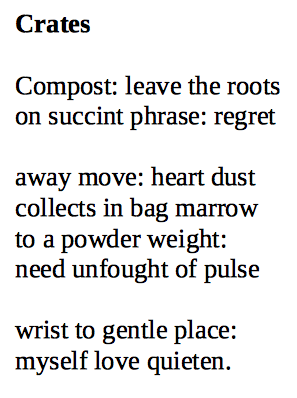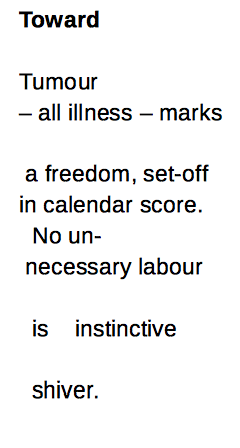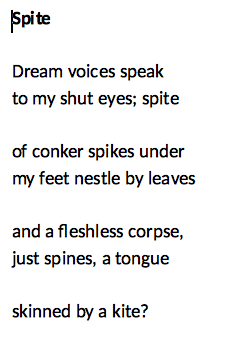


All Justice
All justice is unearnt
(placate rd she said:
his up hands).
One half inch from
day tastes of water.
Due to the poems’ non-music (A), under analysis (B) sensuous content seems grotesque (D) and opposed to language and new poetry (C). I hope via the anonymity of my voice to prompt the reader into noticing their appetite, their own role in their projections upon their senses. In order to make this interesting, I shape the poem (its meaning) around a resignation in the face of our appetitive desires. If you do so for long enough, the poem seems to become mock heroic. Odd

Contra Auberach’s grotesque revolution, nothing changes, but perhaps we become more conscious of decadence…
I have read that poem too_many times. At first I just found it calming / reassuring, and a little later I decided it was shaped around sexual jealousy. I figured that – perhaps in all poetry – form calms shape. I get few of the allusions, enough to worry about song-birds and rats. But, going through the prologue of The Canterbury Tales, I was struck by how tonally close the first line of Eliot’s poem is, to its prose paraphrase. This could be by circumstance. But could one rewrite The Waste Land in the 21st century by writing with the music of various poems or parts of poems, contemporary or historical, but shifting the tone to that of those poems’ prose paraphrase?
A relatively simple trick…
Long collection: 42 series of, I guess you could call them, aphorisms, amounting to 400 pages. It’s unfinished. Can’t decide if it’s about Susan Sontag’s orgasm (whose essay on camp I didn’t read), or the Iraq war (you don’t need a “sieve” – or a “halo” – to make marmalade, though I enjoyed the hurried tone for its close). The penultimate “trances” to the first series should illustrate what gets the poet – Wayne Koestenbaum – to exit his mental states:
necking in
semi public, I again
praised my phallus or
what passes as my
phallus and he said “anus”
as if I didn’t have a headache
———-
disastrous plunge into
abyss, but what
is abyss and why do I
call it mother?
This collection seems authentic and post modern. Obviously, it’s not just about sex, neither each “trance” nor how they sing together: so definitely “camp”. I suppose that they consist of their smartness, which is either faux-unique or faux-repetitive. I’d consider it less “sprawl” than addictive.
Every insight adds up, to something, I suppose his father, which lacks closeness. I would like to compare it with O’Hara’s poetry: the latter feels more focused, even-though this collection may not pale next to it.
“Je est un autre”, said Rimbaud to Paul Demeny in 1871.
I claimed that my poems would work via voice, and that this should not resolve. But there may be a multiplicity of voices to them, and each might involve self ownership.
However, form is like .onion protocol. It anonymises me, even-though at the end of the poem (exit relay) my identity (IP address) can in principle be found via ‘timings‘.
“The exit relay is the final relay in a Tor circuit, the one that sends traffic out to its destination. The services Tor clients are connecting to (website, chat service, email provider, etc) will see the IP address of the exit relay instead of the real IP address of the Tor user.”
“As no intentional latency is introduced, timing patterns propagate through the network and may be used to correlate input and output traffic, allowing an attacker to track connection endpoints.”
So I am nearly – but not quite – completely anonymised: at its close the timing, humour, to the confessional voice is open to the world and more or less indeterminate (make of it what you will), and the speaker can be thought of as constructed from the interplay of similar moments, into a poem without easy resolution.

so around my blog there’s notes defining the value of art
how irrelevant – energetically dissolved – their content is, internal to the work only.
and poetry
Figuration should – I hope – inch us closer to the everyday world, by momentarily suspending the necessity of anything outside its language.
and criticism
challenge our ideas about ‘everyday life’ so that we can think about it again, despite our immiseration
but what about specifically these poems, especially if they are new lines romantic lyric poems? Ron Silliman talks about the “deeper chaos” to some of Jack Spicer’s work; I hope that these poems fulfil their aesthetic role when ‘voice’ is more disordered yet no less assured.
All these are instances of non-resolution: of the whole; of the relation to the world; of the world; and of self ownership.
By M Leahy. I can’t quote from it, nor detail the procedures used in composition, because I’ve lost the book, which I haven’t finished yet. I like how the poems do at times demand you read them via the compositional procedures, and how this at least gestures at the rest of the work.
Form for me is how to read.
The difficulty I have with it is trying to identify the whole, what I am reading the poem for; the relation of each identified fragment to all the others. I would suggest that is found in the failure of the voice.
What is ‘voice’? If we think of “voice” in these poems as variations in the difficulty of identifying fragments, procedures etc., by the reader, then, as that means voice intrinsically involves form, this collection may be seen as a continuation of Pound’s project.
We may then consider Pound’s poems in terms of their superficial aspect, identified in The New Sentence, of fragments formed incoherently, that is around the need to identify their source, and Pound’s poetry as formally a poetry of voice.
I read this collection as a continuation of that, one in which the deeper coherence to quotation, a hermetic order or critical appropriation of the original, does not really exist: the voice fails because it is just voice.
Read next to Pound, this is an interesting deconstruction (it seems Leahy intended it to be “sounded / performed / read in that present without inclination back to a source / origin or forward to a conclusion / resolution”).
by Maggie O’Sullivan.
Is it a coincidence that my two favourite recent collections are about lapwings? I assume not entirely, though this was written 2005-2013.
A perplexing book, with moments of beauty, which are not limited to the sense of the lapwings escaping her language. I like e.g. in the poem ‘continuance’ (which is in pink there)
‘saying it over’ – ‘you make me say it over’
which I like as a fabricated reflexivity on her apparent need for musical closure in the first – title – poem in the collection; Billy Mills refers to how “visual and audio aspects of the work exist in parallel, separate but complementary”.
The visible sound of the poem is complete – closed – to itself.
The poems seem strikingly varied, despite how, for me, every line or group of line would be semantically consistent in any poem. And this despite the strength of the line, which really works for me as energetically dissolved content, evidenced by both the supple etymology and the defamiliarization of words by the fragmentary – highly visual – shape of the poems.
Just how good the collection is may depend on the lurking figure of Charles Bernstein (whose ‘Asylum’ is referred to in the notes). I would say she sufficiently repeats an enactment of his performance, especially in relation to the ‘shamanic’ (which comes up in contemporary discussion of innovative poetry) and his promotion of Hannah Weiner’s poetry.
It’s difficult to piece together, but that is certainly not necessary to enjoy its aesthetic (and incidentally it is a large – a4 – colourful hardback, by if p then q)
Paired with ‘Flesh Rays’ in a (print on demand) publication by if p then q, ‘Daytrain’ is a fairly short collection of prose poems of around 10-20 lines, which seems quite a conventional length in conetmporary poetry; the last poem is the shortest, at 7 lines. It is more difficult than ‘Flesh Rays’, which I could happily read without understanding: ‘Daytrain’ is horrible if you’re not here for meaning. Which is pretty instructive about how we construct poems: they work very well if and only if you can put the effort in. Perhaps that is because the language is neither fresh nor tired, how Holloway does not seem to care, at all, about novelty etc., more about fitting as many smart observations as possible into each poem.
E.g., the fifth poem, Iron Fills, begins “Film catching fire in summer, water bringing in the rain, the effort to assimilate is overtaking the precision of the capture these afternoons spent tightening air”. As with each sentence, I am forced into working out which words shouldn’t be read literally. Given the title, one might go with ‘bringing in’, rather than either noun in the phrase, in order to paraphrase it as: ‘filming fire, but wanting rain, the film, like the air, is unfocused’, making for something reaching toward a lush expansiveness (Holloway often seems to be writing on writing, in a broadly speaking Steinian way). Clearly, ‘air as film’ creates a semantic nexus, probably centred on ‘water bringing in the rain’ and a sense of uncomfortable humidity. I don’t have the skill necessary to add much to that, though ‘fills’ reminds me of musical talent, and, if I were to research what exactly was going on, I’d start with the steel industry; steel contains both iron and carbon. So the first sentence reads like an honest expression of powerlessness. The next sentence is about painting (and is not in need of figurative interpretation) and ‘light’, and rewards my analysis with a dynamism, before the third short sentence (the new sentence uses sentence length as torque): “In London some are extremely well”. There is a clear allusion to Ed Dorn’s turbine in the first poem, so it seems safe to claim that Holloway is drawing in many of his political issues into the poem.
My problem with this series is just how heavy it is and in need of work, cf something like The White Stones by Prynne.
These blocks of prose text are formally unapologetic, and a part of me wishes for line-breaks.